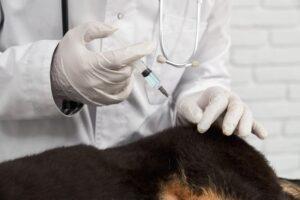Regular veterinary ultrasounds and lab checkups are vital for early detection of health issues in pets, enabling timely and effective treatment. These non-invasive diagnostics provide real-time insights into your pet’s internal health, ensuring they lead a longer, healthier life. This comprehensive guide delves into the significance of veterinary ultrasound and lab checkups, highlighting their benefits, applications, and what pet owners can anticipate during these procedures.
What is a Veterinary Ultrasound?
A veterinary ultrasound is a non-invasive imaging technique used to visualize internal organs, tissues, and abnormalities in pets. It provides real-time images, making it an essential diagnostic tool for detecting illnesses such as:
- Heart diseases (echocardiograms)
- Kidney and bladder issues
- Pregnancy monitoring
- Tumors and abnormal growths
- Liver and gastrointestinal disorders.
Benefits of Ultrasound for Pets
- Safe & Painless: Unlike X-rays, ultrasounds do not use radiation.
- Real-Time Diagnosis: Provides immediate results for faster treatment decisions.
- Early Disease Detection: Helps identify hidden conditions before symptoms appear.
- Guided Procedures: Assists in needle biopsies and fluid extractions.
Understanding Veterinary Ultrasound Imaging for Pets
Why Are Lab Tests Important?
Veterinary lab checkups are crucial for monitoring your pet’s health, diagnosing diseases, and tracking treatment progress. Routine blood work and specialized tests can detect conditions such as:
- Infections & Inflammations
- Diabetes & Thyroid Disorders
- Kidney & Liver Function Issues
- Parasite Infections (Heartworm, Tick Fever, etc.)
- Nutritional Deficiencies
Common Veterinary Lab Tests
- Complete Blood Count (CBC): Analyzes red and white blood cells, platelets, and hemoglobin levels.
- Blood Chemistry Panel: Evaluates organ function, glucose levels, and electrolytes.
- Urinalysis: Detects infections, kidney problems, and urinary tract diseases.
- Fecal Examination: Identifies parasites and digestive disorders.
- Allergy & Hormone Testing: Diagnoses food allergies, endocrine disorders, and skin conditions.
RECOMMENDED:
Advanced Parasite Prevention in Pets: The Complete Guide to Year-Round Protection
Rabies & DHPP Vaccines in Nigeria: Protecting Your Dog’s Health
Essential Health Screenings: Top 10 Laboratory Tests Every Dog Owner Should Know About
Recognizing When Your Pet Requires Diagnostic Ultrasound or Lab Testing
Signs Your Pet Needs a diagnostic procedures:
- Abnormal Blood or Urine Results: Elevated liver or kidney values may prompt the need for an ultrasound to examine these organs.
- Chronic Symptoms: Persistent vomiting, diarrhea, or unexplained weight loss could indicate underlying issues requiring imaging or lab tests.
- Trauma or Injury: After accidents, ultrasounds can assess internal damage or bleeding.
- Pregnancy Monitoring: Ultrasounds are essential for confirming and monitoring pregnancies in pets
When to Schedule Routine Lab Checkups
- Annual wellness exams for early disease detection
- Before surgeries or medical treatments to assess health status
- For senior pets (7+ years) to monitor age-related conditions
- If your pet has a chronic illness requiring regular monitoring
The Veterinary Ultrasound & Lab Testing Process at Dulham Veterinary Clinic
At Dulham Veterinary Clinic, we prioritize pet-friendly diagnostics with minimal stress and maximum accuracy. Here’s what to expect:
- Initial Consultation: Our veterinarians will assess your pet’s symptoms and history.
- Ultrasound Scan or Lab Sample Collection: Depending on the condition, we perform imaging or collect blood, urine, or stool samples.
- Analysis & Diagnosis: Our in-house lab and expert radiologists provide quick and accurate results.
- Treatment Plan Discussion: Based on findings, we recommend the best course of action, whether medication, dietary changes, or further tests.
Cost of Veterinary Ultrasound and Lab Tests in Nigeria
The cost of veterinary ultrasounds and lab tests depends on the type of test, pet size, and complexity of the condition. At Dulham Veterinary Clinic, we offer affordable diagnostic services, ensuring your pet gets quality healthcare without financial strain.
- Basic Ultrasound Scan: ₦30,000 – ₦50,000
- Comprehensive Ultrasound (Abdomen/Heart): ₦50,000 – ₦100,000
- General Blood Test Panel: ₦10,000 – ₦30,000
- Specialized Blood Tests: ₦20,000 – ₦50,000
- Urinalysis & Fecal Tests: ₦5,000 – ₦15,000
Why Choose Dulham Veterinary Clinic?
- Advanced Technology: Cutting-edge diagnostic equipment for precise results.
- Experienced Veterinarians: Skilled specialists in pet health and diagnostics.
- Comprehensive Pet Care: One-stop clinic for consultations, diagnostics, treatments, and preventive care.
- Affordable Pricing: Quality veterinary services at reasonable rates.
- Comfort & Compassion: Stress-free environment to ensure your pet’s well-being.
Prioritize Your Pet’s Health with Dulham Veterinary Services
Early detection and accurate diagnosis are crucial for your pet’s well-being. At Dulham Veterinary Services, we offer expert veterinary ultrasound and laboratory checkups tailored to your pet’s needs. Whether it’s for routine screenings, illness detection, or emergency care, our experienced team is dedicated to providing top-notch veterinary services in Nigeria. Schedule an appointment today to ensure your pet receives the best possible care.
Visit Us
No 23 Crown Court Estate 2, Orunbe close , Oniru. Victoria Island, Lagos.
Phone Us
Mail Us
Frequently Asked Questions
What is a veterinary ultrasound, and how does it benefit my pet?
- A veterinary ultrasound is a non-invasive imaging technique that uses sound waves to create real-time images of your pet’s internal organs. It helps in diagnosing conditions like tumors, cysts, or organ abnormalities, facilitating early and accurate treatment.
How often should my pet undergo lab checkups?
- Regular lab checkups are essential for early detection of health issues. For most pets, annual checkups are recommended, but your veterinarian may suggest more frequent tests based on your pet’s age, breed, and health history.
Are there any risks associated with veterinary ultrasounds?
- Veterinary ultrasounds are generally safe and non-invasive, with no known risks. They provide valuable insights into your pet’s health without discomfort or side effects.
What should I do to prepare my pet for an ultrasound?
- Preparation may vary depending on the type of ultrasound. For abdominal ultrasounds, fasting for 8-12 hours is often recommended to ensure clear images. Always follow your veterinarian’s specific instructions.
How do lab checkups complement ultrasounds in veterinary diagnostics?
- Lab checkups, including blood and urine tests, provide biochemical data about your pet’s health, while ultrasounds offer visual insights into organ structures. Together, they give a comprehensive overview, aiding in accurate diagnosis and treatment planning.

